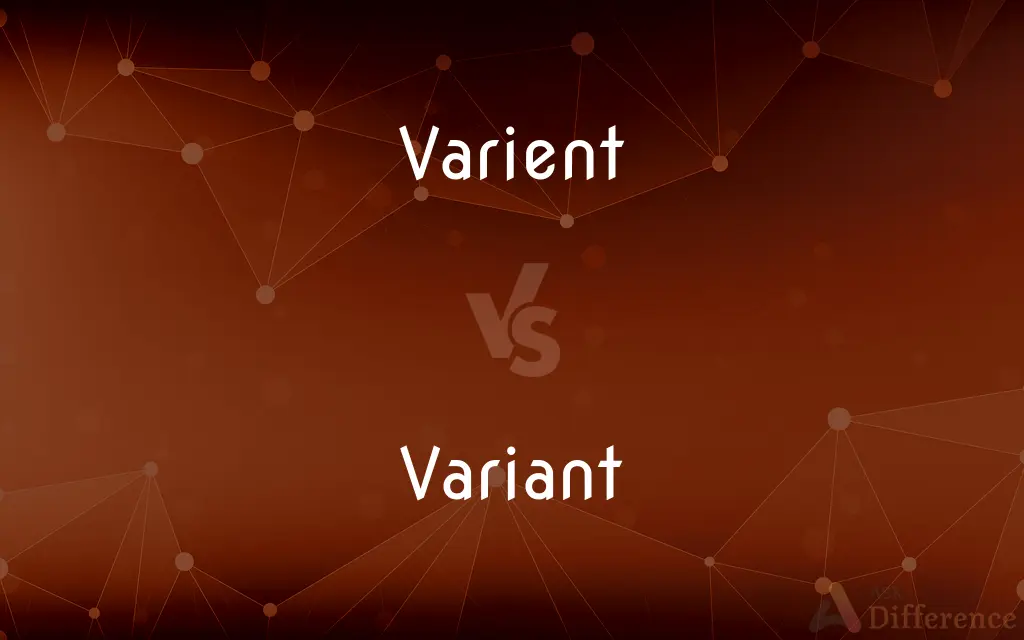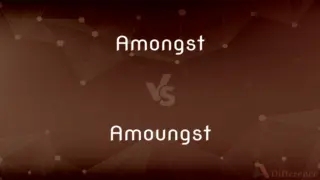Varient vs. Variant — Which is Correct Spelling?
Edited by Tayyaba Rehman — By Fiza Rafique — Updated on March 19, 2024
"Varient" is an incorrect spelling. The correct spelling is "variant," which means a form or version that differs in some way from a standard.

Table of Contents
Which is correct: Varient or Variant
How to spell Variant?

Varient
Incorrect Spelling

Variant
Correct Spelling
ADVERTISEMENT
Key Differences
Remember "ent" is commonly mistaken in spellings; "ant" is the right ending here.
Associate "variant" with "variation."
Think of "variant" containing the word "vari-" as in "variety."
Visualize an "ant" showing different forms or "variants" of itself.
Practice writing: "variety" and "variant" together to remember the correct structure.
ADVERTISEMENT
How Do You Spell Variant Correctly?
Incorrect: This varient seems to be more contagious than the others.
Correct: This variant seems to be more contagious than the others.
Incorrect: Researchers are studying the varient found in the recent outbreak.
Correct: Researchers are studying the variant found in the recent outbreak.
Incorrect: The new varient of the flu is causing concern among health officials.
Correct: The new variant of the flu is causing concern among health officials.
Incorrect: The varient has unique characteristics that make it stand out.
Correct: The variant has unique characteristics that make it stand out.
Incorrect: A vaccine for the latest varient is currently in development.
Correct: A vaccine for the latest variant is currently in development.
Variant Definitions
A form or version different from others.
The virus has a new variant.
An alternative or optional form of something.
They proposed a variant solution to the problem.
A differing sequence or arrangement.
Genetic variants determine our unique traits.
Differing from a norm or standard.
This method is a variant from traditional ones.
Differing from others of the same kind or from a standard
A variant form of the disease.
A book in variant editions.
Having or exhibiting variation; varying
A procedure producing variant results.
Something that differs from others of the same kind or from a standard, as a different spelling or pronunciation of a word.
Showing variety, diverse.
Showing deviation or disagreement.
(obsolete) Variable.
(programming) Covariant and/or contravariant.
Something that is slightly different from a type or norm.
All breeds of dog are variants of the species “Canis lupus familiaris”.
The word "kerosine" is a variant of “kerosene”.
(genetics) A different sequence of a gene (locus).
(computing) A variable that can hold any of various unrelated data types.
One of a set of words or other linguistic forms that conveys the same meaning or serves the same function.
Varying in form, character, or the like; variable; different; diverse.
Changeable; changing; fickle.
He is so variant, he abit [abides] nowhere.
Something which differs in form from another thing, though really the same; as, a variant from a type in natural history; a variant of a story or a word.
An event that departs from expectations
(biology) a group of organisms within a species that differ in trivial ways from similar groups;
A new strain of microorganisms
A variable quantity that is random
Something a little different from others of the same type;
An experimental version of the night fighter
An emery wheel is a modern variant of the grindstone
The boy is a younger edition of his father
Differing from a norm or standard;
A variant spelling
Something slightly different in appearance from others.
The artist provided several variants of his design.
Variant Meaning in a Sentence
Scientists are tracking a new variant that has emerged in Europe.
Each variant has different symptoms and levels of severity.
The vaccine was updated to cover the latest variant of the virus.
Studying genetic variations helps researchers understand how a variant evolves.
Schools may adjust their opening plans based on the prevalent variant.
Laboratories are equipped to identify the variant in patient samples quickly.
Public health measures may vary depending on the variant spreading in the community.
Social distancing and mask-wearing can help reduce transmission of any variant.
The Delta variant was particularly challenging for healthcare systems worldwide.
The effectiveness of existing vaccines against the new variant is being tested.
Quarantine guidelines are updated as new variant information becomes available.
Researchers believe that herd immunity may be more challenging to achieve with this variant.
Travel restrictions were put in place to contain the spread of the new variant.
Each variant requires thorough investigation to assess its impact on public health.
The health department updates its website regularly with information on the variant.
The variant caused an increase in hospitalizations in several regions.
The World Health Organization classifies certain variants as of concern.
Health officials are closely monitoring the spread of the variant in local communities.
Treatment protocols may be revised to better address the symptoms of the variant.
The government may issue new guidelines in response to the emergence of a variant.
Contact tracing is essential in controlling outbreaks caused by a new variant.
Understanding the mutation process helps in predicting future variant developments.
Public health campaigns focus on educating about the dangers of the variant.
Scientists use genomic sequencing to track the spread and evolution of the variant.
Vaccination remains a key strategy in combating the spread of the variant.
Variant Idioms & Phrases
Variant of concern
A variant that shows evidence of being more contagious, more severe, or resistant to current treatments or vaccines.
The health authority declared it a variant of concern due to its rapid spread.
Variant tracking
The monitoring and documenting of variants as they evolve and spread.
Variant tracking is crucial for updating public health policies in real time.
Genetic variant
A difference in the DNA sequence among individuals, groups, or populations.
Researchers are studying genetic variants to discover why some people are more susceptible to certain diseases.
A new variant on the scene
Refers to the emergence of a new form or version of something, typically a virus.
With a new variant on the scene, scientists are working overtime to understand its implications.
Dominant variant
The variant that is the most common and widespread in a particular area at a given time.
The Delta variant quickly became the dominant variant in many countries.
Variant surge
A sudden increase in the number of cases of a particular variant.
The city is experiencing a variant surge, leading to stricter health measures.
Variant detection
The process of identifying and confirming the presence of a variant through testing.
Improved variant detection methods have sped up the response to outbreaks.
Vaccine-induced variant selection
The process by which vaccination pressure can lead to the emergence of new variants.
Scientists are studying vaccine-induced variant selection to understand its impact on pandemic dynamics.
Neutralizing a variant
The ability of the immune system or a treatment to effectively counteract a variant.
The new drug has shown promising results in neutralizing the variant in lab tests.
Cross-variant immunity
Immunity that protects against several different variants of a virus.
Scientists are hopeful that the new vaccine will offer cross-variant immunity.
Resistant variant
A variant that does not respond well to existing treatments or vaccines.
The emergence of a resistant variant could set back the fight against the disease.
Variant classification
The categorization of variants based on their genetic differences and impact on public health.
The global health organization updated its variant classification, adding two more to the list of concerns.
Breakthrough variant
A variant that can infect individuals despite vaccination.
Health officials reported cases of a breakthrough variant, emphasizing the need for ongoing vigilance.
Evolving variant
A variant that is undergoing changes due to mutation.
An evolving variant in the region has health authorities on high alert.
Variant-driven wave
A significant increase in cases primarily attributed to a particular variant.
The country is bracing for a variant-driven wave, with hospitals preparing for more patients.
Superspreader variant
A highly contagious variant that can cause rapid spread of the disease.
To combat the superspreader variant, officials are ramping up vaccination efforts.
Variant outbreak
An occurrence of cases related to a specific variant of a disease.
The hospital is dealing with a variant outbreak among its staff.
Cross-variant transmission
The spread of a virus from one variant to another.
Researchers are concerned about the potential for cross-variant transmission in crowded settings.
Containment of a variant
Efforts to limit the spread of a specific variant.
Containment of a variant involves targeted vaccination and public health measures.
Variant-specific vaccine
A vaccine designed to be effective against a particular variant.
Pharmaceutical companies are working on a variant-specific vaccine to address the latest threat.
Common Curiosities
Why is it called variant?
It's derived from the Latin "variare" meaning "to change."
What is the verb form of variant?
"Vary."
What is the root word of variant?
The root word is Latin "variare."
What is the pronunciation of variant?
It is pronounced as VAIR-ee-uhnt.
What is the singular form of variant?
Variant itself is singular.
Which vowel is used before variant?
Typically, "a" as in "a variant."
Is variant an abstract noun?
No, it's a concrete noun when referring to a specific version, but can be abstract in a broader sense.
Which preposition is used with variant?
"Of" as in "variant of the virus."
Which conjunction is used with variant?
Any conjunction can be used based on context, like "and" or "but."
Is variant an adverb?
No, variant is not an adverb.
Is variant a vowel or consonant?
"Variant" is a word comprised of both vowels and consonants.
Which article is used with variant?
"The" or "a" can be used based on context.
What is the second form of variant?
N/A, it's a noun.
What is the plural form of variant?
Variants.
How many syllables are in variant?
Three syllables.
What part of speech is variant?
It can be both a noun and an adjective.
What is the opposite of variant?
Standard or original.
Which determiner is used with variant?
"This" or "that" can be used, as in "this variant" or "that variant."
Is variant a countable noun?
Yes, e.g., "several variants."
Is the word variant imperative?
No, it's not imperative.
What is another term for variant?
Alternative.
Is variant a collective noun?
No, it's not a collective noun.
Is the variant term a metaphor?
No, but it can be used metaphorically in various contexts.
What is a stressed syllable in variant?
The first syllable, "var."
Is variant a noun or adjective?
Variant can be both a noun and an adjective.
Is variant a negative or positive word?
It's neutral; context determines its connotation.
How do we divide variant into syllables?
Var-i-ant.
What is the first form of variant?
Nouns don't have forms like verbs, so "variant" itself is the primary form.
What is the third form of variant?
N/A, it's a noun.
How is variant used in a sentence?
"Scientists are studying a new variant of the disease."
Share Your Discovery

Previous Comparison
Amongst vs. Amoungst
Next Comparison
Owch vs. OuchAuthor Spotlight
Written by
Fiza RafiqueFiza Rafique is a skilled content writer at AskDifference.com, where she meticulously refines and enhances written pieces. Drawing from her vast editorial expertise, Fiza ensures clarity, accuracy, and precision in every article. Passionate about language, she continually seeks to elevate the quality of content for readers worldwide.
Edited by
Tayyaba RehmanTayyaba Rehman is a distinguished writer, currently serving as a primary contributor to askdifference.com. As a researcher in semantics and etymology, Tayyaba's passion for the complexity of languages and their distinctions has found a perfect home on the platform. Tayyaba delves into the intricacies of language, distinguishing between commonly confused words and phrases, thereby providing clarity for readers worldwide.














































